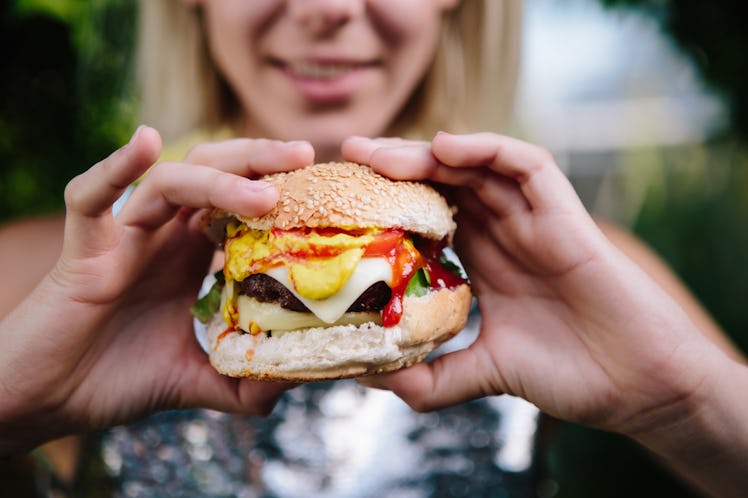
Here's What Can Happen To Your Body When You Eat Your Food Too Quickly
If you're a fast eater, you probably know it by now — not because you've figured this out yourself, necessarily, but because you've been told by everyone in your life that you eat too quickly. You're the first one to finish every meal, and you often gaze longingly at the meals of those around you who are slowly and methodically moving through their eggs Benedict. Being a fast eater might lead to some FOMO near the end of the meal, but have you ever wondered if eating too quickly is actually bad for you?
As it turns out, it kind of is, for a number of reasons. The first reason is kind of obvious: If you eat really quickly, then there's a chance that you're not actually chewing and swallowing carefully, and you could choke. Once the food gets into your stomach, though, you're still not necessarily in the clear.
According to LIVESTRONG, eating too quickly can potentially lead to a whole host of health issues, both in the short- and long-term. In the short-term, you can give yourself indigestion (the symptoms of which can range from feeling heavy in your stomach, to feeling like you're having a literal heart attack), because your stomach is having trouble properly processing so much food at once.
If you tend to feel kind of yucky after your meals, or you're burping a lot, that might be a sign of indigestion from eating too quickly.
In the long-term, LIVESTRONG reports that fast eating can lead to a disassociation between your hunger and your eating patterns. When you eat really quickly, the outlet explains, you might not be paying attention to exactly how much food you need to feel satisfied, and over time, you might stop noticing those signals in your body that tell you when you're still hungry versus when you feel full.
Moreover, a 2008 study published by the Journal of the Academy of Nutrition and Dietetics reiterated this same issue by testing both fast and slow female eaters, and seeing who felt the most satisfaction after finishing their meal. Ironically enough, the women who ate their meals the fastest were the least satisfied with their meal.
If you're unsatisfied with your meal, you might end up eating more even if you don't want to, thus potentially creating more indigestion for yourself, and nobody needs more of that nonsense in their life.
Of course, this leads to an obvious question: How fast is too fast when it comes to eating food?
When you feel "full" after a meal, it's the result of hormones being released from the gut and stomach as they process your food. But if you eat quickly, you might keep eating before your body even has the opportunity to release those hormones, since the food might not have even entered your gut yet.
According to Huffington Post Australia, it can take up to 20 minutes to really feel full. For that reason, you should try to take around the same amount of time to eat your meal. That way, if you're still hungry after 20 minutes, you can comfortably continue eating, or you can stop eating, because you now know that you're actually full, thus saving yourself from that mid-afternoon crash from an especially big meal.
The bottom line is this: Your relationship with your food should always be as healthy and enjoyable as possible.
It probably won't make you feel too great to put on a 20-minute timer while you eat your meals, but maybe instead of focusing solely on eating your food as fast as you can, you can actually enjoy talking to the people around you between bites, or even mimic the person in your life who likes to take their sweet ol' time when they eat. If you're eating alone, have a book with your meal to give you something else to do between bites.
Either way, your body will surely thank you if you chew a few extra times. Look at it this way: It means you get more quality time with your food, and honestly, doesn't that sound great?